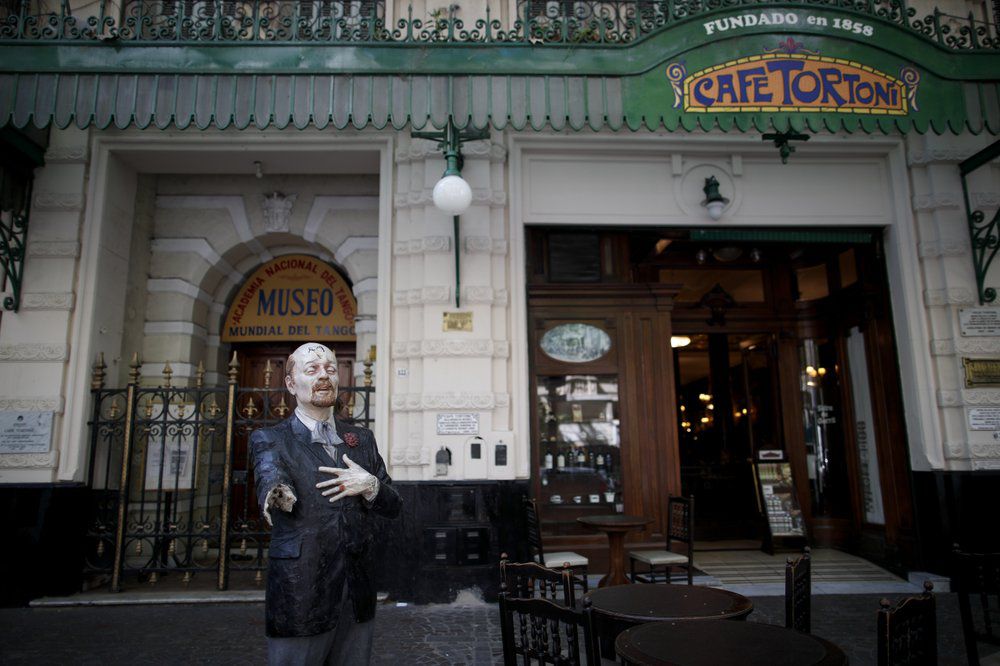
Just like the afternoons of Buenos Aires They have that “what do I know, did you see?”, as narrated in the unforgettable “Balada para un loco” by Piazzolla and Ferrer, entering the magnetic “city of fury” by Soda Stereo would not be the same without making a stop in one of its historical cafés, the same ones in which Carlos Gardel, Jorge Luis Borges or Julio Cortázar sat.
Meeting place, over the decades, of writers, musicians, tango players, athletes or politicians, or simply key points of the idiosyncrasy of each neighborhood, more than 80 bars in the Argentine capital are considered “notable” and make up the heritage cultural heritage of the city, due to its antiquity, architectural style or local relevance.
“There are many that are historical because the construction dates from the 18th century, the 19th century, and others that have a very important cultural insertion in the area where they are located,” says Felipe “Toto” Evangelista, president of the Subcommittee of Notable Bars of the Chamber of Cafes and Bars.
Premises that “have that village feel, of a village bar,” he remarks, to highlight the “magic” they give off and that makes the “parishioner” feel in a special place.
Coffees day
October 26 is Buenos Aires Coffee Day – approved by the local Parliament in 2000, two years after the notable bar figure. The date recalls the day the Café Tortoni was inaugurated, the oldest of the bars that still exist in the city.
Founded in 1858, since 1894 it is located on the historic Avenida de Mayo, where it stands as one of the major tourist attractions in the capital. Illustrious people such as Borges and Cortázar, but also Federico García Lorca and many other popular faces sat at their tables. Faith of this are given by the innumerable memories that hang on its walls.
In the celebration of the day, this year a tour was made in an old bus, which, to the rhythm of jazz, made stops in downtown cafes, the area most affected by the restrictions due to COVID-19, which caused the definitive closure of several notables.
Today, with the new normal after the improvement of the pandemic, “a very important recovery is being seen”, according to Julián Díaz, who runs four bars, two of them -Los Galgos and El Roma del Abasto- notable.
Past and present
There are all kinds of them: billiards, confectioneries, many with a tango or soccer flavor, and with Argentine Creole gastronomy. From the Café de los Angelitos, where Gardel scored several of his triumphs; passing through Las Violetas, which was frequented by the poet Alfonsina Storni and chosen in 2017 as the best Notable Café in a citizen survey, or La Biela, an obligatory stop in front of the Recoleta cemetery.
“There is a historical issue and also a present one, because if not, we always remain in the logic of the past. And what we have worked for is that they once again become relevant places for culture and a meeting point for people who today continue to write, draw, write scripts, think … ”, says Díaz.
Descendant of Asturians who came to Argentina 90 years ago and dedicated themselves to gastronomy, his is a vocation: “I came to school here near Los Galgos, and I always liked this bar and had affection for old-fashioned bars and with that I I became fond of the idea of working on recovering places that we did not want to be lost ”.
“Most of those in charge of notable bars have them for a feeling and a sense of belonging to the place,” adds Evangelista, who runs El Viejo Buzón in the Caballito neighborhood.
The son of an Italian immigrant, ‘Toto’ was born a few meters from where his bar is, whose name he chose for the mailbox located in front of the door, who liked to escape as a child from the nearby store where his father worked.
The bar was opened 35 years ago where an old bakery had operated, and its proximity to Club Ferro Carril Oeste and his brother’s friendship with some of the players imbued it with a football atmosphere. “The first place where Germán ‘El Mono’ Burgos sang rock was in El Viejo Buzón. It was karaoke at the beginning, ”he recalls.
And now, decades later, Evangelista continues to defend tooth and nail a heritage that is a hallmark of ‘porteñidad’.
.
Ricardo is a renowned author and journalist, known for his exceptional writing on top-news stories. He currently works as a writer at the 247 News Agency, where he is known for his ability to deliver breaking news and insightful analysis on the most pressing issues of the day.












